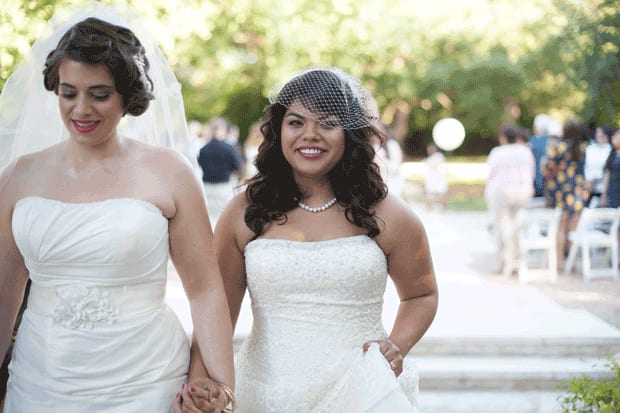Q Cinema film fest includes a timely, Texas-based doc on marriage equality

SCOTT HUFFMAN | Contributing Writer
scott_in_dallas@yahoo.com
For LGBT Texans and their allies, Feb. 26, 2014 was noteworthy if not revolutionary. On that day, San Antonio federal judge Orlando Garcia ruled that Texas’ ban on same-sex marriage was unconstitutional. While Judge Garcia stayed his ruling pending appeal, it was a watershed moment for out Dallas filmmaker Rebecca Rice.
“My partner and I looked at each other and said, ‘My God! We’re going to have marriage equality in Texas!’” Rice recalls. “I honestly thought that it would never get here. I thought it would move on from state to state to state for years, maybe for decades.”
Rice, who earned a graduate degree in filmmaking at SMU, immediately knew that she had to suspend these moments in time. She feared that once same-sex marriage was legalized, the struggle to achieve it might begin to fade from the collective memory. Rice felt the best way to memorialize the changing tide was to film first -person interviews with LGBT couples about their relationships and pursuit of marriage. The result of her efforts is the documentary We Do, which will screen at Fort Worth’s Q Cinema next Saturday. (For reviews of several other films at the festival, including the opening night movie, see sidebar, Page 29.)
“I love all that history. I thought it was a chunk of time that was going to be lost,” Rice says. “The younger generation would take [marriage equality] for granted. They are going to think we’ve always had these rights. I wanted to preserve something so we won’t forget — to document what happened and what people had to do.”
Rice’s film profiles three same-sex couples: Leta and Anne Kalfas of Denver, Mariel and Viviana Baluja of Austin, and Michael and Michael Serrecchia-Robinson of Dallas. The film also features an interview with Jim Mitulski, a former pastor at the Cathedral of Hope. Rice’s original idea was to keep the film brief and limited in scope. After completing the first interview with Mariel and Viviana, though, the project took on a life of its own.
“I originally intended to do a 20-minute documentary,” Rice says. “I just wanted to get people’s stories about getting married. I had no idea how much they were going to share and how rich their stories were and how much bigger this was going to be in terms of their stories.”
Rice’s second interview was with Leta and Anne Kalfas. The fact that the couple were starting a family together (Anne was pregnant at the time and has since given birth to their son Apollo), gave the film a new dimension. Jaxson, Leta’s biological son from a previous relationship and half-brother to Apollo (the couple used the same donor’s sperm), also participated in the project.
“They had an equally compelling story, but a little bit different,” Rice says. “They had the support of both of their families. The angle was when Leta began talking about when gays and lesbians have children — that it’s so intentional and never accidental. There are so many things that we have to think about in life that straight people don’t. That’s a big one. Having children takes a lot of effort if you are LGBT.”
 Rice’s introduction to the film’s third couple was a gift of sorts from her longtime friend Donatelle Mascari. She insisted that Rice meet “the Michaels,” as they are known — one of whom, Serrecchia, shares his coming out story in New York City at the time of Stonewall. It was as if the final piece of the puzzle had fallen into place.
Rice’s introduction to the film’s third couple was a gift of sorts from her longtime friend Donatelle Mascari. She insisted that Rice meet “the Michaels,” as they are known — one of whom, Serrecchia, shares his coming out story in New York City at the time of Stonewall. It was as if the final piece of the puzzle had fallen into place.“I went over to their house — a complete stranger that they had never met,” Rice says. “They let me interview them. They told me their story. I felt their story was amazing. I feel each of these couples embodies a different decade. It overlaps in our collective gay and lesbian history. It adds to the story arc of what we’ve been through to get to this point in time.”
Rice has recently screened the film at festivals in Austin and Palm Springs and at special events. Two Dallas screenings bookended the week of June 26 when SCOTUS announced its ruling. Audience response has been positive, and Rice is enjoying the fruits of her labor.
“It’s not like. ‘Hollywood, here I come!’” Rice jokes. “This film is a little snapshot film. It’s going to speak to certain people. It’s going to be important to our community. It feels similar to finishing graduate school. It feels like I accomplished something I wanted to do.”
Despite documenting the matrimony of others, Rice and her partner Rose have yet themselves to marry. They do, however, have a plan.
“[We want] to get married on our 10th anniversary,” Rice says. “We don’t have any children besides two cats. They don’t get any inheritance rights. I think because we put all our financial and legal ducks in a row, we have the luxury of waiting until it’s a romantic moment for us.”
This article appeared in the Dallas Voice print edition October 2, 2015.


